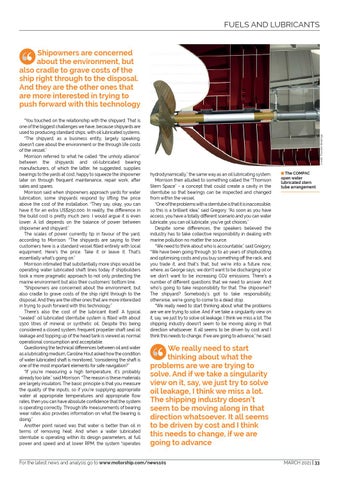FUELS AND LUBRICANTS
‘‘
“You touched on the relationship with the shipyard. That is one of the biggest challenges we have, because shipyards are used to producing standard ships, with oil lubricated systems. “The shipyard, as a business entity, largely speaking, doesn't care about the environment or the through life costs of the vessel.” Morrison referred to what he called “the unholy alliance” between the shipyards and oil-lubricated bearing manufacturers, of which the latter, he suggested, supplies bearings to the yards at cost, happy to squeeze the shipowner later on through frequent maintenance, repair work, after sales and spares. Morrison said when shipowners approach yards for water lubrication, some shipyards respond by lifting the price above the cost of the installation. “They say, okay, you can have it for an extra US$250,000. In reality, the difference in the build cost is pretty much zero. I would argue it is even lower. A lot depends on the balance of power between shipowner and shipyard.” The scales of power currently tip in favour of the yard, according to Morrison. “The shipyards are saying to their customers here is a standard vessel filled entirely with local equipment. Here's the price. Take it or leave it. That's essentially what's going on.” Morrison intimated that substantially more ships would be operating water lubricated shaft lines today if shipbuilders took a more pragmatic approach to not only protecting the marine environment but also their customers' bottom line. “Shipowners are concerned about the environment, but also cradle to grave costs of the ship right through to the disposal. And they are the other ones that are more interested in trying to push forward with this technology.” There's also the cost of the lubricant itself. A typical “sealed” oil lubricated sterntube system is filled with about 1500 litres of mineral or synthetic oil. Despite this being considered a closed system, frequent propeller shaft seal oil leakage and topping up of the head tank is viewed as normal operational consumption and acceptable. Questioning the technical differences between oil and water as a lubricating medium, Caroline Hout asked how the condition of water lubricated shaft is monitored, “considering the shaft is one of the most important elements for safe navigation?” “If you're measuring a high temperature, it's probably already too late,” said Morrison. “The reason is these materials are largely insulators. The basic principle is that you measure the quality of the inputs, so if you're supplying appropriate water at appropriate temperatures and appropriate flow rates, then you can have absolute confidence that the system is operating correctly. Through life measurements of bearing wear rates also provides information on what the bearing is doing.” Another point raised was that water is better than oil in terms of removing heat. And when a water lubricated sterntube is operating within its design parameters, at full power and speed and at lower RPM, the system “operates
Credit: Thordon Bearings
Shipowners are concerned about the environment, but also cradle to grave costs of the ship right through to the disposal. And they are the other ones that are more interested in trying to push forward with this technology
hydrodynamically,” the same way as an oil lubricating system. Morrison then alluded to something called the “Thomson Stern Space” - a concept that could create a cavity in the sterntube so that bearings can be inspected and changed from within the vessel. “One of the problems with a sterntube is that it is inaccessible, so this is a brilliant idea,” said Gregory. “As soon as you have access, you have a totally different scenario and you can water lubricate, you can oil lubricate, you've got choices.” Despite some differences, the speakers believed the industry has to take collective responsibility in dealing with marine pollution no matter the source. “We need to think about who is accountable,” said Gregory. “We have been going through 30 to 40 years of shipbuilding and optimising costs and you buy something off the rack, and you trade it, and that's that, but we're into a future now, where, as George says, we don't want to be discharging oil or we don't want to be increasing CO2 emissions. There's a number of different questions that we need to answer. And who's going to take responsibility for that. The shipowner? The shipyard? Somebody's got to take responsibility, otherwise, we're going to come to a dead stop. “We really need to start thinking about what the problems are we are trying to solve. And if we take a singularity view on it, say, we just try to solve oil leakage, I think we miss a lot. The shipping industry doesn't seem to be moving along in that direction whatsoever. It all seems to be driven by cost and I think this needs to change, if we are going to advance,” he said.
8 The COMPAC open water lubricated stern tube arrangement
‘‘
We really need to start thinking about what the problems are we are trying to solve. And if we take a singularity view on it, say, we just try to solve oil leakage, I think we miss a lot. The shipping industry doesn't seem to be moving along in that direction whatsoever. It all seems to be driven by cost and I think this needs to change, if we are going to advance
For the latest news and analysis go to www.motorship.com/news101
MARCH 2021 | 33



